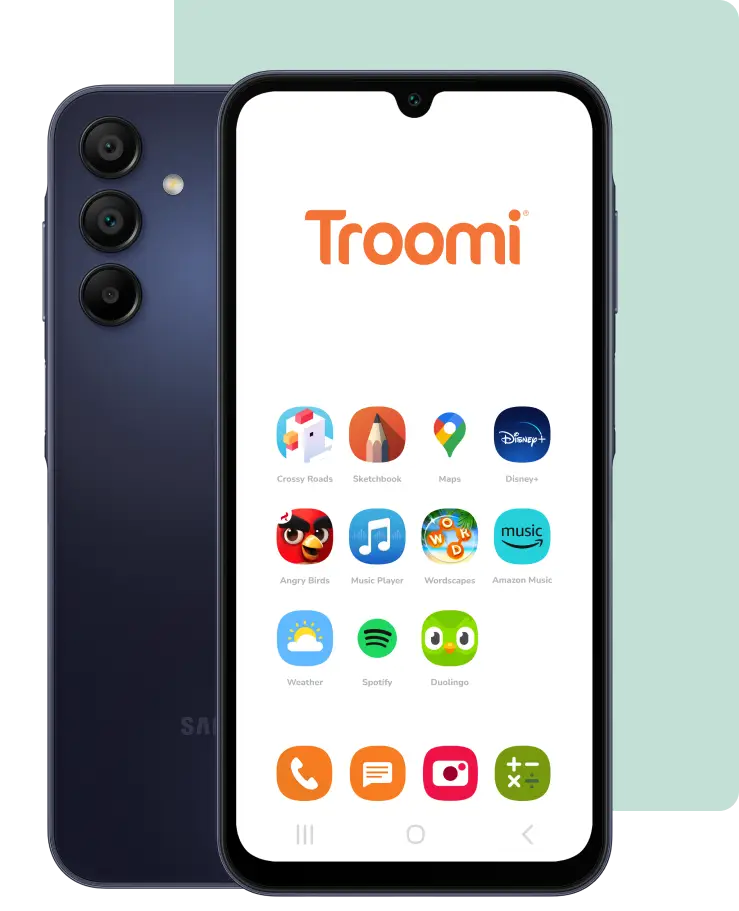Time seems to move pretty fast in our online world. Between the demands of digital school and the hypnotic effect of video games and social media, it can be difficult for kids to know how to effectively manage their time. However, time management is a skill that kids (and adults) utilize at pretty much every stage of life, so it’s vital that kids develop a sturdy foundation for prioritization.
Here on the Troomi blog, we’ve already talked a bit about how to teach kids good time management skills. As writer Shanna Hovley says, “Start with the basics. Teach them how to measure time, how clocks work, and how much time things take.” Once you’ve introduced your kiddo to the basics, completing a time management activity together is a great way to reinforce the concepts—and have some fun along the way.
Before we delve into our catalog of fun time management activities, let’s learn a bit more about why these skills are so important.
Why Is Time Management Important?
Believe it or not, knowing how to manage time and prioritize tasks is one of the most important skills a child can have. The world is pretty thrilling, and with so many exciting things competing for a child’s attention, good time management skills make it easier for them to process their emotions and enjoy their day.
Here are a few perks of good time management, courtesy of VerywellFamily:
- Better decision-making skills
- Better performance at work and school
- Increased responsibility and independence
- More opportunities to relax and unwind
- More time for family and friends
- Reduced anxiety when projects are due in school or test dates are approaching
As your child grows into a teen and prepares to enter the adult world, having a good foundation of time management will save them a lot of unnecessary stress.
Time Management Activities
So how do you teach time management? While you could try holding an at-home lecture series on the benefits of creating a schedule, it wouldn’t be very effective. After all, kids learn by having fun—so a time management activity is the perfect way to help them learn.
Without further ado, here are ten time management activities that will help your kids learn how to best prioritize their time.
1. Create Crafty Calendars
A calendar is one of the most important tools on your child’s journey to successful time management. It keeps them organized and helps them visualize their schedule so they know their commitments and what tasks they have to accomplish each day. Teaching your child how to use a calendar can be a bit tedious, so make it fun by turning it into a craft!
You can start this craft in one of two ways. The first is to find a blank calendar template online (like this one) and print it out, then have your child number the days and months by looking at an already existing calendar—like the one on their nifty Troomi phone. On the other hand, if your kiddo is feeling particularly industrious, just get out a blank piece of paper, a ruler, and pencil, and set them loose to create their calendar themselves. Let them decorate it however they see fit: using crayons, markers, colored pencils, stickers, or whatever their preferred artistic medium is.
Once your child has decorated their calendar, sit down with them and take note of everything they have going on that month, then transfer the info onto the calendar. They can denote particularly special days with stickers or doodles. Then, spend a few minutes each morning going over your child’s calendar with them. Remind them about what they have that day, and don’t forget to ask them what they think they should prioritize.
2. Create a Family Calendar
A personal calendar is pretty beneficial—but what about a family calendar?
Family calendars are especially useful. All it takes is one look to know what everyone has to do on a particular day! Having a calendar that contains everyone’s commitments is also a great way to help your child develop their time management skills. After all, kids learn best by example, and following the family calendar is a great way for you to model how you prioritize your time.
Set aside some family time to craft together and create your own family calendar. It’s easy—just follow the same instructions as the personal version above. Take turns designing it and import everyone’s important days onto the calendar. Then, hang it in a place of honor where everyone can see it.
3. Play a Game of Clock Quiz
Calendars aren’t the only tools that can help with time management. Enter: the clock.
Watching the hour, minute, and second hands revolve around a clock is a great way to show children how time passes. Reading an analogue clock is something of a lost art to the digital generation, however, so help your child perfect their clock skills by playing a game or two of clock quiz. All you need is a set of flashcards with clocks drawn on them.
Here’s how it works: Show participants the flashcard, and ask them to take turns saying what time the clock says. If they get it right, they get a point. Whoever has the most points at the end of the game, wins!
If that’s a bit too easy, you can amp up the difficulty by turning into a speed challenge. As you flash both competitors the clock, have them answer at the same time. Whoever says the answer first gets the point!
4. Whisk Your Child Into the Kitchen
This one might surprise you, but there’s no better way to teach your child time management than to whisk them into the kitchen. Baking is a pretty precise science, and the time a cake or quiche spends in the oven can really make a difference in the quality of the finished product.
As you and your child devise a delicious treat, show them how to set a timer. Working with a timer in the kitchen helps kids understand that managing their time is vital to completing tasks successfully. Use a physical kitchen timer if you can, since they’re more tactile and visual than a digital timer. No worries if you don’t have one—a smartphone timer (like the one available on all Troomi phones) works just as well.
5. Play “How Long Is a Minute?”
One of the best ways to practice time management is to experience time itself. To help your child get a good idea of how long it takes for time to pass, play a quick game of the aptly named “How Long Is a Minute?”
The game is really simple—all you need is a stopwatch. Here’s how it works:
- The timer (that’s you) tells the players “go” and starts their stopwatch.
- The players then sit quietly and shut their eyes.
- Once they think a minute has passed, players raise their hand and open their eyes.
- The timer stops their stopwatch as soon as one minutes passes.
- The player that got closest to a minute wins!
6. Create a Chore Chart
Not many kids I know enjoy doing chores. Chores are the antithesis of fun, and most kids want them over with as soon as possible—making them the perfect tool to teach time management. After all, knowing how to prioritize unpleasant tasks helps with productivity and lessens the risk of procrastination.
I can attest to this one. When I was younger, every Saturday morning began with a chore list. My mom would write out everything that needed to get done around the house, and we would start working as soon as the morning began (and after a hefty bowl of Lucky Charms, of course). Once our tasks were complete, we were free to play outside or have some screen time.
Like a calendar, a job list or chore chart helps children visualize how best to manage their time. To get your kids excited about chores (if that’s even possible), try making a family chore chart together! Pull out the markers and crayons, then let your kids design their own chart on a large piece of posterboard. Once it’s done, hang it up somewhere everyone can see it.
Update the chart every morning to let your little ones know what needs to get done that day. When they see their handiwork in action, they may be more inspired to follow along and learn how to prioritize.
7. Hold a Chore Competition
A nifty, new chore chart may not be enough to get kids excited about practicing time management. If that’s the case, try turning chore time into a competition by holding your very own Chore Olympics!
Using your chore chart, give your children a few tasks to accomplish and set them loose. Whoever completes their assigned chores first, wins! By placing a competitive element into the mix, many kids will get excited about accomplishing their tasks and inherently start prioritizing so they can finish fastest. After all, it takes a bit of planning to win the gold medal at the Chore Olympics.
Not sure what kind of chores to give your kids? Check out this article for some tips!
8. Do a Good Ol’ Fashioned Puzzle
When was the last time you sat down with your kids and did a good ol’ puzzle? If it’s been a while, I recommend pulling one out soon! Not only are they fun, but they’re extremely beneficial, and may help your kids develop their time management skills.
Finishing a puzzle can take hours. If you know some tricks and are able to manage your time well, however, they can move along pretty speedily. As you sit down to do the puzzle, show your kids how to speed the process up by separating it into these simple steps:
- Turn all the pieces picture side up
- Separate edge pieces and inner pieces
- Assemble the border using the edge pieces
- Fill in the rest of the puzzle!
Puzzles take a lot of trial and error. As your kiddos practice, however, both their puzzling and their time management skills are sure to improve!
Troomi Helps Your Kids Stay Scheduled
Calendars, clocks, and a time management activity are all nifty tools that can help your children develop their skills, but wouldn’t it be even niftier if these tools were available on-the-go? Well, with a kid-friendly Troomi phone, they are! The built-in Calendar and Clock apps available on every smartphone from Troomi Wireless make it easy for your child to learn how to manage their time effectively and appropriately—all with the click of a button. Click here to learn a bit more!
And don’t forget to swing on by the Troomi blog again for more parenting tips and tricks.


